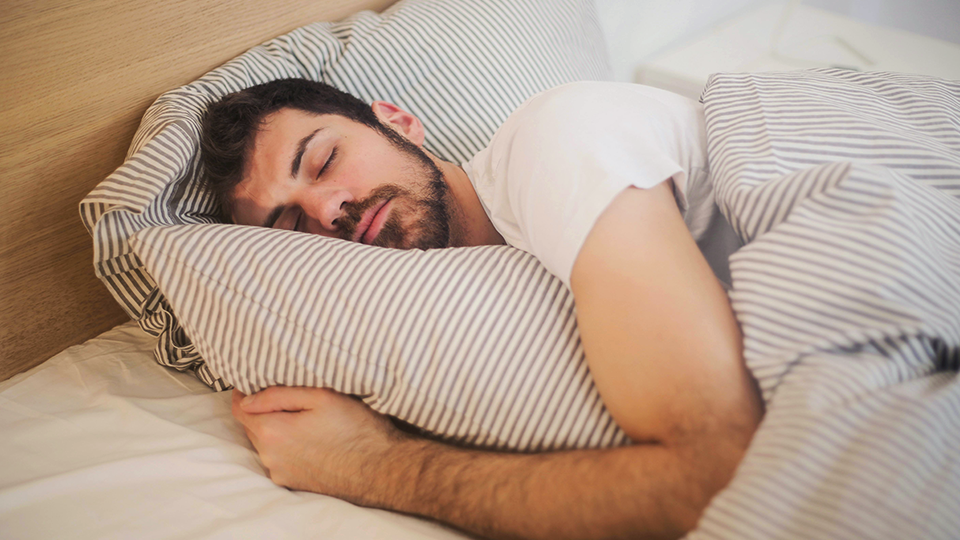Sleep is essential for overall wellbeing. Yet, many adults aren’t getting enough of it. According to the CDC, adults need at least 7 hours of sleep per night, but about 1 in 3 regularly fall short.1
The recent change in time can make that even harder, disrupting your body’s natural rhythm and leaving you feeling sluggish or out of sync. Quality rest supports brain function, muscle repair, and memory while helping your body recover from daily stress. To help your body adjust and prepare for deeper, more restorative sleep, try these five evening rituals designed to calm your mind and promote relaxation.2
Limit Blue Light
Too much blue light before bed can disrupt your melatonin production, which impacts your ability to fall asleep and stay asleep. Try switching off your phone and avoiding the TV and computer too close to bedtime.
What is blue light anyway? Blue light is a type of high-energy visible (HEV) light on the color spectrum that’s emitted by the sun as well as digital devices like phones, tablets, and computer screens. While natural blue light helps regulate your body’s sleep-wake cycle and boosts alertness during the day, too much exposure can make it harder to fall asleep.
Prepare Your Environment
Your body naturally responds to bright light and activity by staying alert. If you’re trying to wind down, creating a calm environment can make a big difference. Dimming the lights, reducing distractions, and keeping your bedroom tidy help signal to your body and mind that it’s time to relax and prepare for restful sleep.
Keeping a melatonin product like best-selling Renewal Sleep Support™ by your bed can ensure that even on nights when you’re unable to perfect your evening rituals or bedtime environment, you’re still giving your body its best chance at a restful night.
Build a Bedtime Routine
Evening rituals work best when they’re part of a consistent bedtime routine. Going to bed and waking up at the same time each day helps regulate your body’s internal clock, making it easier to fall asleep and wake up feeling refreshed.
Building a steady nighttime schedule means planning out when you’ll have dinner, take a shower, turn off your screens, and settle into bed. Over time, these cues train your body to recognize when it’s time to unwind.
Fuel Your Body Properly
Understanding how food affects your body and sleep is essential. If you tend to wake up hungry, a light snack that’s low in fat and sugar can help keep you comfortable through the night. However, eating too close to bedtime can strain your digestive system and may cause heartburn, bloating, or indigestion. It can also make it harder to fall asleep because your body is busy processing food.
On the flip side, not getting enough sleep can contribute to weight gain! If you struggle with late-night cravings but want better rest and support for your wellness goals, the Bedtime Belly Buster Bundle can be a smart addition to your evening routine.
The Bedtime Belly Buster is a nutritious night-time drink combining Tri-Release Protein powder with Greens™ to satisfy late-night cravings, which may aid in releasing stubborn belly fat† — plus Renewal Sleep Support for a restful slumber.
De-stress: Partake in Something You Find Relaxing
Stress is a major disruption to sleep, so finding a relaxing evening ritual can be the key to unwinding. Whether it’s running a warm bath, reading a book, journaling, or meditating, it’s important to know what relaxes you and build it into your nightly routine.
Connecting with yourself and resetting at the end of the day ensures you go to sleep with a peaceful mind and wake up more well rested. Products like Adaptogen Elixir™ can help your mind and body combat stress through its botanicals and adaptogens, supporting better sleep quality.†
Sleep is undeniably essential for your brain, body, and overall health. Evening rituals like preparing a nighttime routine, avoiding screens, or fueling your body wisely can help you achieve more restful sleep. Investing in a sleep routine and quality sleep products can help you sleep better and wake up ready to take on the day!
References:
- Center for Disease Control (CDC). FastStats: Sleep in Adults. May 2024.
- National Heart, Lung, and Blood Institute. Sleep Brochure. December 2018.
†These statements have not been evaluated by the Food and Drug Administration. The products discussed are not intended to diagnose, treat, cure, or prevent any disease.





